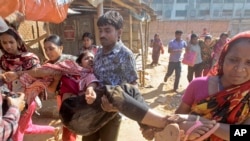NEW DELHI —
Bangladesh’s garment industry is witnessing more turmoil as garment workers demanding higher wages clash with riot police. About 200 factories have been closed and at least 50 people have been injured in two days of labor unrest.
There were expectations that a government-appointed panel’s recommendation to hike minimum wages of garment workers to about $66 per month would have been welcome news in an industry where the current minimum wage is just $38 per month.
The industry’s 4 million workers, however, have turned down the proposal for the 75-percent hike. They are demanding a wage of about $100 per month.
Thousands of angry workers came out on the streets in the Ashulia industrial belt on the outskirts the capital Dhaka for the second day Tuesday, hurling stones and attacking factory owners. Riot police fired tear gas shells and rubber bullets to disperse the protestors.
A Next Collection Limited employee, Jhoma Begum, said workers need more money. She said a salary of $66 does not meet their needs. She said nothing in the market, such as rice, costs less than 75 cents. She demands to know how they can live with this salary and asks whether they have the right to live?
The low wages paid to workers in Bangladesh have partly helped to catapult its ready-made industry to the world’s second largest, after China. The wages are just half of those paid to workers in countries like Vietnam.
Worried that a salary hike will take away its competitive edge, though, the industry has not yet endorsed the recommendations of the government panel. They fear it will increase production costs significantly.
Economist Khondaker Golam Moazzem at the Center for Policy Dialogue in Dhaka said the protests by the workers are meant to put pressure on the factory owners to accept the wage hike.
“I think if they accept the proposal, more or less the workers will calm down and the situation will improve. Entrepreneurs said they should take a more positive move to raise the workers wages,” said Moazzem.
The industry has been hit by the violent protests over wages when it already is under scrutiny for unsafe conditions following a building collapse in April that killed more than 1,100 workers.
Moazzem said Bangladesh needs to resolve the labor unrest if it hopes to continue getting trade privileges from the European Union, which are under review for the next year.
“Definitely this kinds of protests and unrest for better wages if continues, has an adverse impact in terms of Bangladesh’s global image as well as continuing GSP [Generalized System of Preferences] facility, particularly in the European market,” said Moazzem.
Activist groups, who support the demand for higher wages, say Western buyers also need to recognize the need to improve payments to the industry so that salaries can be raised.
There were expectations that a government-appointed panel’s recommendation to hike minimum wages of garment workers to about $66 per month would have been welcome news in an industry where the current minimum wage is just $38 per month.
The industry’s 4 million workers, however, have turned down the proposal for the 75-percent hike. They are demanding a wage of about $100 per month.
Thousands of angry workers came out on the streets in the Ashulia industrial belt on the outskirts the capital Dhaka for the second day Tuesday, hurling stones and attacking factory owners. Riot police fired tear gas shells and rubber bullets to disperse the protestors.
A Next Collection Limited employee, Jhoma Begum, said workers need more money. She said a salary of $66 does not meet their needs. She said nothing in the market, such as rice, costs less than 75 cents. She demands to know how they can live with this salary and asks whether they have the right to live?
The low wages paid to workers in Bangladesh have partly helped to catapult its ready-made industry to the world’s second largest, after China. The wages are just half of those paid to workers in countries like Vietnam.
Worried that a salary hike will take away its competitive edge, though, the industry has not yet endorsed the recommendations of the government panel. They fear it will increase production costs significantly.
Economist Khondaker Golam Moazzem at the Center for Policy Dialogue in Dhaka said the protests by the workers are meant to put pressure on the factory owners to accept the wage hike.
“I think if they accept the proposal, more or less the workers will calm down and the situation will improve. Entrepreneurs said they should take a more positive move to raise the workers wages,” said Moazzem.
The industry has been hit by the violent protests over wages when it already is under scrutiny for unsafe conditions following a building collapse in April that killed more than 1,100 workers.
Moazzem said Bangladesh needs to resolve the labor unrest if it hopes to continue getting trade privileges from the European Union, which are under review for the next year.
“Definitely this kinds of protests and unrest for better wages if continues, has an adverse impact in terms of Bangladesh’s global image as well as continuing GSP [Generalized System of Preferences] facility, particularly in the European market,” said Moazzem.
Activist groups, who support the demand for higher wages, say Western buyers also need to recognize the need to improve payments to the industry so that salaries can be raised.




![Activists and garment workers shout slogans during a protest demanding a minimum wage of 8,000 Bangladeshi Taka [$100] in Dhaka, Bangladesh, Nov. 8, 2013.](https://gdb.voanews.com/f6083e8e-a511-4ed3-95de-d470443acd6b_cx0_cy4_cw0_w250_r1_s.jpg)
